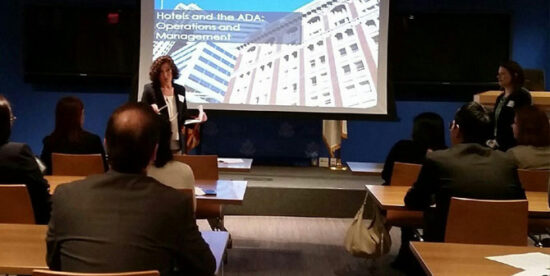
It was 11:00 p.m., and an International Visitor Leadership Program (IVLP) participant had just checked-in to her hotel. She went to her room and immediately knew something was wrong: Her wheelchair wouldn’t fit through the door. The hotel staff offered another room, but the bed was too high to allow the visitor to transfer from her chair. It was close to midnight before the hotel found a suitable room, leaving the visitor exhausted and upset.
This true story is not an example of hotel or programer negligence. In fact, the U.S. Embassy had told the Program Officer at the U.S. Department of State that this visitor used a wheelchair. The National Program Agency (NPA) had requested an “‘ADA’ hotel room”, and the hotel had provided one. But if everyone involved had known there is no one-size-fits-all Americans with Disabilities Act (ADA) accommodation, mistakes like this could have been prevented. It’s also important to note that disabilities are not limited to mobility issues. Learning the appropriate vocabulary and asking the right questions when booking a hotel are key.
… my goal became clear: to learn which DC and New York City hotels used by the IVLP excel at providing ADA services and facilities and to communicate my findings to the program’s stakeholders.
This incident was a catalyst for my interest in hotel compliance with the Americans with Disabilities Act and in disability rights in general. I procure and manage the IVLP Preferred Hotel Lists for Washington, DC, and New York City, serving as the liaison for the IVLP, NPAs, and partner hotels when issues arise.
After I attended a training session at the U.S. Access Board and accompanied one of its accessibility experts on his hotel site-visits, my goal became clear: to learn which DC and New York City hotels used by the IVLP excel at providing ADA services and facilities and to communicate my findings to the program’s stakeholders.
I consulted with Victoria Langteigne, a senior accessibility specialist at the Washington office of Steven Winter Associates, Inc., a consultancy that specializes in ADA compliance for commercial and residential buildings. We agreed that Victoria would develop a pilot training session geared for hotel professionals and those dealing with IVLP hotel accommodations for visitors with a disability. The training session debuted in Washington, DC in September 2014 and was repeated in New York in April 2015. The audiences included Department of State programmers, representatives from all seven NPAs, and numerous sales personnel from the IVLP preferred hotels in DC and NYC.
Basic, yet invaluable lessons included how to use People First Language, and Disability Etiquette. For example, it’s more respectful to refer to a “person with a disability” than “a disabled person”. We also learned the right questions to ask when booking a room for someone with a disability. For example, when reserving an ADA room for a visitor who uses a wheelchair, one should ask in advance for the chair’s dimensions and if a particular bed height is required. If the visitor is vision- or hearing-impaired, one should ask in advance what specific accommodations are needed.
We… learned the right questions to ask when booking a room for someone with a disability.
Some hotels are not aware of both major and minor problems with their ADA facilities. I’ve seen a roll-in shower with the faucet well beyond the reach of anyone using it. I’ve seen a ramp with no handrails leading to a public restroom. I’ve also seen a thermostat in an ADA room mounted so high on a wall that someone in a wheelchair could never reach it. For those making hotel arrangements for IVLP visitors with disabilities, it’s a good idea to check out a hotel’s ADA compliant facilities to determine if they meet the visitor’s needs. It’s also important to know that ADA compliance is considered a civil rights issue. Non-compliance can lead to serious legal problems for a hotel or an organization.
Those of us committed to providing the best experience possible for IVLP visitors should educate ourselves and each other. We need to take advantage of comprehensive resources such as Mobility International USA (MIUSA), an organization committed to disability rights globally, with the ultimate goal of providing IVLP visitors with disabilities the most comfortable hotel experiences available in our communities.
By Judy Donner, Global Ties U.S. Follow us on Twitter: @GlobalTiesUS
